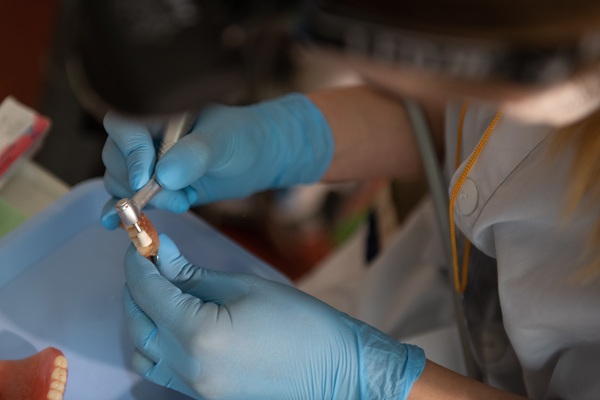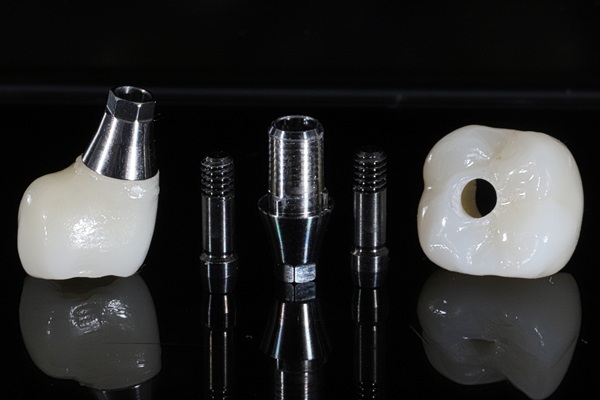What Happens if Gum Disease Goes Untreated?

Gum disease is a common oral health issue that dentists treat. You may focus more on cavity prevention, but gum issues can be just as critical to your wellness. Putting off treatment can cause more serious issues. You should first recognize the signs and symptoms of this condition and then seek your dentist’s help right away. If you address gum problems promptly, your general dentist can prevent additional consequences and even reverse its effects. There are also things you can do to combat the disease on your own.
An understanding of gum disease
Also known as periodontitis, this disease affects the tissue in your mouth. It can destroy the gums and, eventually, cause tooth loss and bone loss. The condition starts out as gingivitis, which includes swelling and bleeding of the gums. Unchecked, it can become more severe, causing pain and discomfort. Other symptoms can include bad breath, gum recession, and spaces between the teeth.
Periodontitis occurs when bacteria build up on the teeth and at the gumline. This causes a sticky substance, known as plaque, to form. When it hardens, it becomes tartar, which destroys the gums and teeth. Brushing twice a day and flossing daily are the most effective ways to prevent the disease. Using a mouthwash can help eliminate bacteria in the mouth as well. People should also regularly see the dentist for examinations and checkups.
Tooth loss
As gum disease progresses, the teeth can begin to pull away from the gums. This can cause the teeth to become loose and shift. Over time, the teeth could fall out on their own. The teeth could also be more prone to being knocked out.
Bone loss
Along with tooth loss, there can also be problems with the jaw. As gum disease becomes more serious, the jaw can shrink, deteriorating the bone that supports the teeth. Bone loss not only contributes to tooth loss, but it can change the shape of the person’s face. It can also affect speech. Once there is bone loss, it cannot regrow on its own; the dentist would have to do a bone graft.
Infections
The bacteria that cause gum disease can impact more than the gums and teeth. If the patient does not receive treatment, infections can develop in the mouth. This can cause intense pain and may require a root canal or tooth extraction. The infection could spread throughout the mouth and face.
Cardiovascular issues
Perhaps the most alarming consequence of ignoring gum disease is that it can get into the bloodstream. When this happens, the infection can reach the heart, affecting the cardiovascular system. Periodontitis is a cause of heart disease. This condition can lead to a heart attack or stroke.
A matter to take seriously
You should care about your health, and it can start with your gums. Flossing and brushing regularly will reduce your risk of developing gum disease. It is clear to see why you should not put off getting help for this condition. If your gums hurt or are swollen or bleeding, talk to your dentist right away.
Request an appointment here: https://www.trilliumdental.us or call Trillium Dental at (614) 343-0227 for an appointment in our Columbus office.
Check out what others are saying about our dental services on Yelp: Gum Disease in Columbus, OH.
Recent Posts
If your dentist has diagnosed you with gum disease, you should seek treatment right away. If you do not address this problem quickly, it can become increasingly more serious. The faster you identify this condition, the more likely you are to treat it effectively. With the right intervention at the right time, you can reverse…
Flossing is an important component of preventive dentistry. Flossing must always accompany daily brushing. This may seem insignificant. After all, it involves running a line of floss through the thin gaps of your teeth. Even so, flossing benefits your teeth. If you want to know how valuable flossing is for preventive dentistry, here are the…
Preventive dentistry can support your efforts to keep your mouth healthy, including practicing good oral hygiene, eating a balanced diet, and avoiding things that can damage your teeth and gums. Good oral hygiene goes a long way in helping to prevent common dental issues, such as tooth decay and gum disease, but sometimes it is…
The role of preventative dentistry is to minimize the risk of future dental issues in patients. Read on to learn some tips that encourage the prevention of oral issues. If you have experienced and treated dental issues in the past, you will attest that it is better to prevent them from happening in the first…


